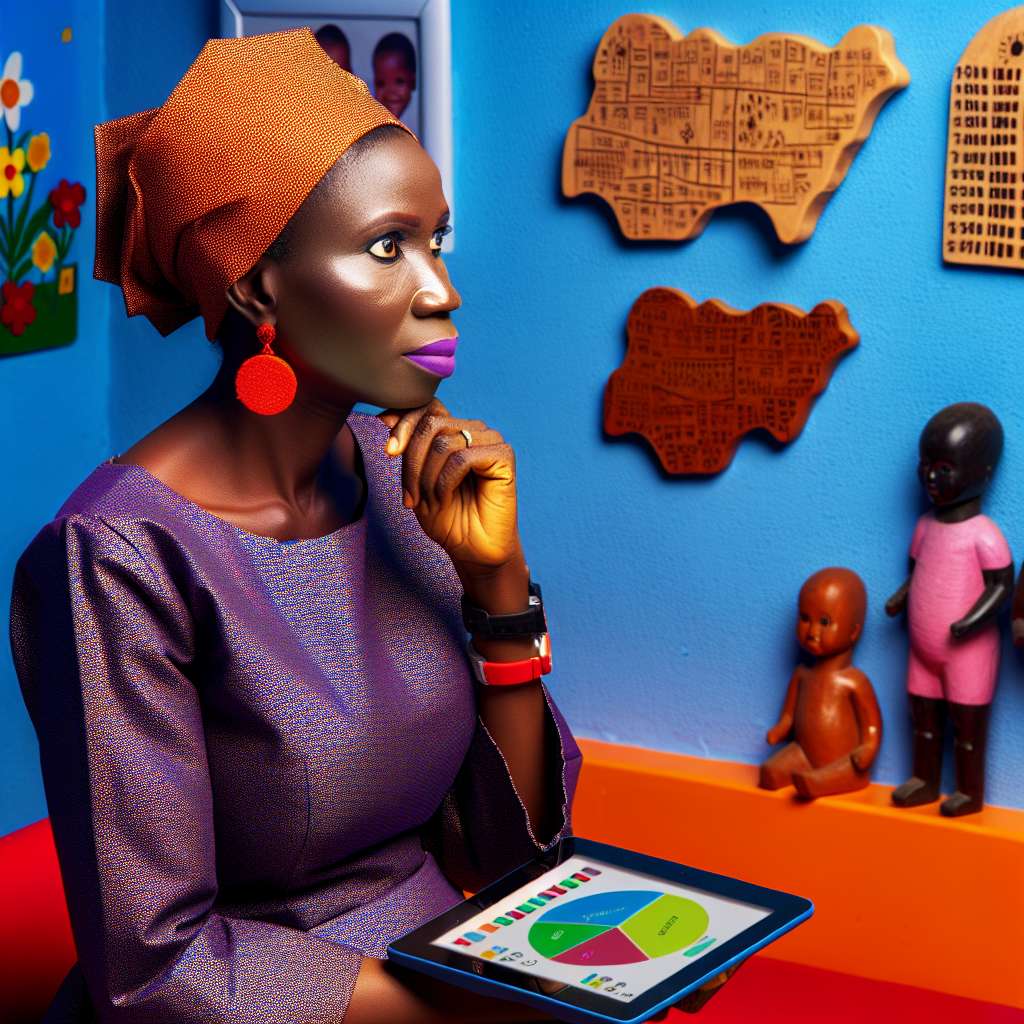Introduction:
Child development milestones are key indicators of a child’s growth and progress.
It is crucial to track these milestones in Nigeria to ensure proper development and early detection of any delays.
Cultural and environmental factors can significantly impact the milestones that children in Nigeria reach.
Understanding these variations can help caregivers provide appropriate support and interventions.
Physical Development Milestones:
- Walking is typically achieved around age 1 in Nigerian children.
- Crawling usually begins between 6-10 months of age.
- Fine motor skills like picking up small objects develop around age 2.
Factors that may affect physical development in Nigerian children:
- Malnutrition can lead to stunted growth and delayed motor skills.
- Poor access to healthcare may result in untreated illnesses affecting development.
- Environmental factors like pollution can impact a child’s physical well-being.
Physical development in Nigerian children follows a similar trajectory to children around the world.
However, it’s important to consider specific factors that may influence how children in Nigeria reach their milestones.
Walking is a major physical milestone that typically occurs around the age of 1.
Nigerian children may begin walking a bit later due to factors like malnutrition or lack of proper healthcare.
Encouraging opportunities for physical activity can help support the development of walking skills.
Crawling is another essential developmental stage that usually begins between 6-10 months of age.
This milestone allows children to explore their environment and build strength in their arms and legs.
Factors such as limited space for movement or lack of stimulation may delay crawling in Nigerian children.
Fine motor skills, such as picking up small objects, are typically developed around the age of 2.
These skills require coordination and dexterity, which can be influenced by access to proper nutrition and early stimulation.
Children in Nigeria may face challenges in developing fine motor skills if they lack the necessary resources for adequate growth and development.
Factors that may affect physical development in Nigerian children include malnutrition, which can lead to stunted growth and delayed motor skills.
Additionally, poor access to healthcare may result in untreated illnesses that impact a child’s development.
Environmental factors like pollution can also have negative effects on a child’s physical well-being.
It is crucial for caregivers and healthcare providers to monitor children’s physical development closely and provide support where necessary.
Creating a safe and stimulating environment, ensuring access to nutritious food, and seeking healthcare when needed are essential steps in promoting healthy physical development in Nigerian children.
By understanding the unique challenges that children in Nigeria may face, we can work towards ensuring that all children have the opportunity to reach their full developmental potential.
Cognitive Development Milestones:
Language development is a key milestone in cognitive development.
Problem-solving skills develop as children grow and learn.
Memory development is crucial for learning and retaining information.
Challenges Nigerian children may face in reaching cognitive milestones:
- Limited access to quality education and educational resources.
- Socio-economic factors may hinder cognitive development in some children.
- Cultural beliefs and practices that do not prioritize cognitive development.
How to support cognitive development in Nigerian children:
- Encourage language development through reading and storytelling.
- Provide opportunities for problem-solving activities and critical thinking.
- Foster a supportive environment that values and encourages learning.
- Collaborate with schools and communities to promote cognitive development.
- Seek professional help if there are concerns about cognitive delays.
Importance of Cognitive Milestones:
Cognitive development milestones are important for children’s overall growth and learning.
By understanding the challenges Nigerian children may face and implementing strategies to support cognitive development, we can help them reach their full potential.
You Might Also Like: Anesthesia in Oral Surgery: Nigerian Practices
Social and Emotional Development Milestones:
Children in Nigeria typically reach milestones in forming relationships, expressing emotions, and understanding empathy.
As children grow, they begin to show signs of attachment to primary caregivers, such as parents or grandparents.
This attachment helps them build trust and learn how to interact with others in a positive manner.
Nigerian children also start to develop a sense of self-awareness and a range of emotions, from joy to frustration.
They may start expressing their feelings through words, actions, or body language, depending on their developmental stage.
Understanding empathy is another crucial aspect of social and emotional development in Nigerian children.
This involves recognizing and responding to the feelings of others, which helps in building healthy relationships with peers and adults.
Cultural Influences on Social and Emotional Development in Nigerian Children:
Nigerian culture plays a significant role in shaping social and emotional development in children.
Children are often taught to respect their elders and show empathy towards others from a young age.
Traditional values, such as communal living and strong family ties, also impact how children learn to interact with others.
Nigerian children are encouraged to express their emotions openly, but also to control them in certain situations.
Cultural practices, such as storytelling, music, and dance, help children develop emotional intelligence and social skills.
The community-centered nature of Nigerian culture fosters a sense of belonging and support for children’s emotional well-being.
Transform Your Career with Expert Guidance
Get personalized mentorship consulting that’s tailored to your unique path. Our expert advice is actionable and exclusive.
Get StartedThe rich cultural heritage of Nigeria influences how children learn to navigate social relationships and manage their emotions.
By understanding these cultural influences, parents and caregivers can better support children’s social and emotional development in Nigeria.
See Related Content: ENT Surgery and Lifestyle Changes Post-Operation
Communication Development Milestones:
Milestones in speech and language development.
Importance of early communication skills in Nigerian children.
Communication development in children is a crucial aspect of their overall growth and development.
The ability to communicate effectively through speech and language plays a significant role in a child’s cognitive, social, and emotional development.
Milestones in Speech and Language Development:
Speech and language development in children follow a typical progression of milestones.
These milestones indicate the child’s ability to understand and use language effectively.
In Nigerian children, these milestones are essential for their academic success and social interactions.
- Babbling Stage: Around 6 months, babies start producing repetitive sounds like “ba,” “ma,” “da,” signaling the early stages of speech development.
- First Words: By 12 months, children typically say their first words like “mama” or “dada,” showing progress in language development.
- Two-Word Phrases: Around 18-24 months, children start combining two words like “more milk” or “big dog,” demonstrating growing language skills.
- Complex Sentences: By 3-4 years, children can form complex sentences and engage in meaningful conversations, showcasing advanced language development.
Importance of Early Communication Skills in Nigerian Children:
Early communication skills play a vital role in a Nigerian child’s overall development and success in various aspects of life.
Here are some reasons why these skills are crucial:
- Academic Success: Good communication skills help children excel in school, participate in class discussions, and comprehend academic material effectively.
- Social Interaction: Effective communication enables children to build strong relationships, express their thoughts and feelings, and engage with peers and adults in a meaningful way.
- Cognitive Development: Language skills are linked to cognitive development, problem-solving abilities, and critical thinking skills, essential for overall cognitive growth.
- Emotional Expression: Communicating effectively allows children to express their emotions, regulate their feelings, and seek support when needed, promoting emotional well-being.
- Cultural Identity: In a diverse country like Nigeria, communication skills help children connect with their cultural roots, express their heritage, and embrace their identity confidently.
Communication development milestones are crucial for Nigerian children to thrive academically, socially, emotionally, and culturally.
Parents, caregivers, and educators play a vital role in supporting and nurturing these skills in children to ensure their holistic development.
Gain More Insights: Blood Bank Services and Availability in Nigeria
Behavioral Development Milestones:
Behavioral development milestones are crucial in a child’s overall growth and development.
It involves the ability to regulate emotions, follow rules, and cope with various situations.
Here are some key milestones in behavioral development that Nigerian children should achieve:
- Milestones in self-regulation, following rules, and coping with emotions
- Common behavioral challenges faced by Nigerian children and how to address them
1. Self-regulation:
Nigerian children should gradually learn to manage their emotions and behavior in different situations.
They should be able to control their impulses, wait for their turn, and express their feelings appropriately.
2. Following rules:
Understanding and following rules is an important behavioral milestone for Nigerian children.
They should learn to respect authority, follow instructions, and adhere to social norms within their community.
3. Coping with emotions:
Nigerian children should develop the ability to identify and manage their emotions effectively.
They should learn healthy ways to express and regulate their feelings, such as talking about their emotions or engaging in physical activities.
While every child develops at their own pace, there are common behavioral challenges that Nigerian children may face along the way.
Here are some of these challenges and strategies to address them:
1. Aggression:
Some Nigerian children may struggle with aggressive behavior, such as hitting, kicking, or yelling.
Parents and caregivers can help by teaching them alternative ways to express their anger, such as deep breathing or using words to communicate their feelings.
2. Tantrums:
Tantrums are a common behavioral challenge among Nigerian children, especially during their toddler years.
Parents can address this by setting clear boundaries, offering choices, and providing positive reinforcement for good behavior.
3. Peer conflicts:
Nigerian children may experience conflicts with their peers, such as arguments or disagreements.
Parents can teach them conflict resolution skills, such as compromising, listening to others’ perspectives, and seeking help from an adult when needed.
4. Attention-seeking behavior:
Some Nigerian children may exhibit attention-seeking behavior to get noticed or gain approval.
Parents can provide positive attention for good behavior, set aside dedicated time for one-on-one interactions, and encourage independence to reduce attention-seeking behavior.
5. Oppositional defiance:
Nigerian children may show oppositional behavior by refusing to follow instructions or challenging authority figures.
Parents can address this by setting clear expectations, offering choices within limits, and providing consequences for negative behavior while rewarding positive behavior.
Understanding the behavioral development milestones and challenges faced by Nigerian children is essential for parents and caregivers to support their growth and well-being.
By recognizing these milestones and addressing behavioral challenges effectively, Nigerian children can develop important social and emotional skills to thrive in various aspects of their lives.
Gain More Insights: Top ENT Hospitals and Clinics in Nigeria

Cultural Influences on Development:
Nigerian culture plays a significant role in shaping child development milestones.
Traditional practices and beliefs impact how children grow and learn.
Cultural norms influence parenting styles and the way children are raised.
Storytelling, music, and dance are common cultural practices that enhance child development.
Respect for elders and authority is emphasized in Nigerian culture, shaping children’s perceptions.
Gender roles and expectations are also influenced by Nigerian culture.
The extended family system in Nigeria provides a strong support network for children.
Traditional ceremonies and rituals mark important milestones in a child’s life.
The importance of community and social connections is emphasized in Nigerian culture.
Importance of Considering Cultural Factors When Assessing Development in Nigerian Children:
Understanding cultural influences helps professionals create effective interventions for children.
It is essential to consider cultural beliefs and practices when evaluating developmental progress.
Misinterpretations of behaviors may occur if cultural contexts are not taken into account.
Cultural sensitivity is crucial for accurate assessment and support for Nigerian children.
Recognizing and respecting diversity in cultural values promotes positive development outcomes.
Collaboration with families and communities is essential for culturally responsive interventions.
Cultural competence enhances the quality of services provided to Nigerian children.
Tailoring interventions to align with cultural norms increases their effectiveness.
Building trust and rapport with families is key to understanding the cultural context of child development.
Cultural influences are integral to understanding child development milestones in Nigeria.
By recognizing the impact of traditions, beliefs, and practices, we can better support the growth and well-being of Nigerian children.
Monitoring and Tracking Milestones:
As parents and caregivers in Nigeria, it is crucial to monitor and track your child’s development milestones to ensure they are meeting their growth and developmental expectations.
Here are some tools and methods for monitoring child development milestones in Nigeria:
- Regular Pediatric Check-ups: Schedule routine visits to the pediatrician for thorough assessments.
- Developmental Screening Tests: Use standardized tests to assess your child’s developmental progress.
- Observation and Documentation: Observe your child’s behavior, skills, and abilities and document any concerns.
- Child Development Apps: Utilize technology to track your child’s milestones with interactive apps designed for this purpose.
- Parent Questionnaires: Answering questionnaires can provide insights into your child’s development in various areas.
Regular check-ups and assessments are of utmost importance for early identification of developmental delays in children.
Here’s why:
- Early Intervention: Identifying delays early can lead to early intervention and support for the child.
- Prevention of Long-term Issues: Addressing delays promptly can prevent long-term developmental issues.
- Effective Treatment Plans: Early detection allows for the implementation of effective treatment and therapy plans.
- Parental Education: Parents can gain knowledge and skills to support their child’s development better.
- Emotional Support: Early identification of delays can provide emotional support to both the child and the family.
By consistently monitoring and tracking your child’s developmental milestones, you can ensure they reach their full potential and thrive in all aspects of their growth and development.
Child Development Milestones in Nigeria
Child development milestones are crucial indicators of a child’s growth and progress.
In Nigeria, it is essential for parents, caregivers, and healthcare providers to monitor these milestones closely.
Physical Development
From infancy to early childhood, Nigerian children should reach milestones such as sitting up, crawling, and walking within expected time frames.
Cognitive Development
Children in Nigeria should demonstrate cognitive milestones like recognizing familiar faces, responding to their names, and engaging in pretend play as they grow.
Language Development
Language milestones are significant, with Nigerian children expected to babble, say simple words, and eventually form sentences as they develop.
Social-Emotional Development
Children in Nigeria should exhibit emotional milestones like forming attachments, understanding emotions, and developing empathy towards others.
Significance of Tracking Milestones
Tracking child development milestones in Nigeria is vital for ensuring optimal growth and well-being.
Parents, caregivers, and healthcare providers must prioritize monitoring children’s development to support their overall development.
Additional Resources
Prevalence and associated risk factors for noma in Nigerian children …
Inequities in child survival in Nigerian communities during the …




